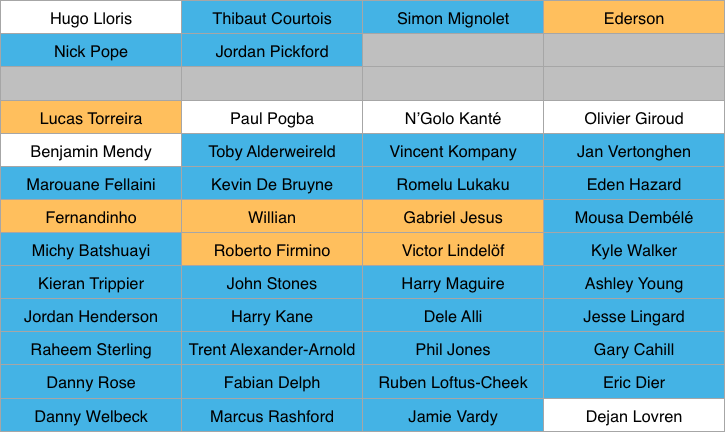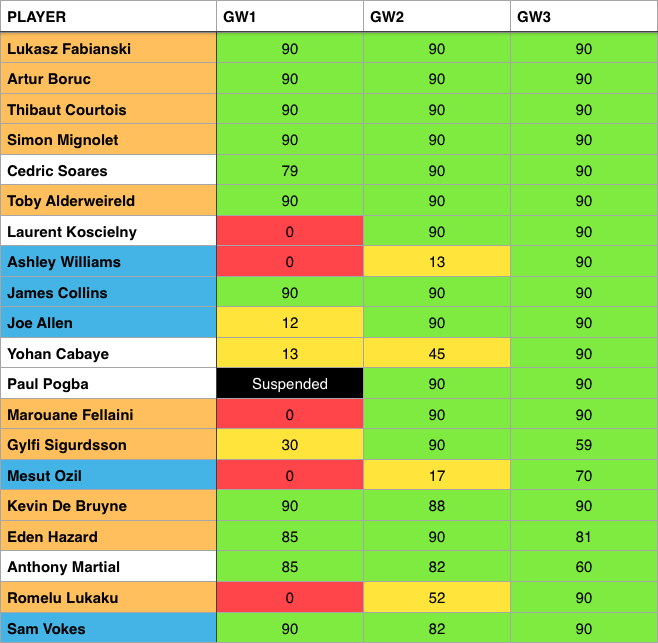The common assumption about players that have participated in the latter stages of the World Cup is that they should be avoided in FPL as a result of a late return to pre-season training. I certainly agree with this view to an extent, but wanted to explore whether there were any observable trends, purely about game time, that can be deduced from the data following the 2014 World Cup. These findings could then potentially inform our thinking ahead of the 2018/19 season.
The reason for only considering player game time and not their actual FPL performance during those games is that a player’s points in a given gameweek are affected by a multiplicity of factors. Varying fixture difficulty or the effect of new signings for example could play a part when determining how many FPL points the player in question gains during those gameweeks. Whereas, solely looking at player game time ensures that only the physical condition of the players following the World Cup is considered and it is that information that we can draw conclusions from.
To test this theory, I constructed a sample of 24 players who both reached the quarter-finals or later of the previous World Cup in 2014 and played for Premier League teams during the subsequent season (2014/15). The quarter-finals were set as a minimum requirement because those players eliminated in the Round of 16 had at least six weeks recovery time (2-3 weeks holiday, 3-4 weeks pre-season) ahead of Gameweek 1. That appeared ample recovery time, meaning that the effect of World Cup progression on Premier League game time would not have been applicable to those players.
In order to make this as fair a sample as possible, players that played fewer than 20 Premier League matches in the 2014/15 season were not included in the sample. The reason for this is that their absence during the opening few gameweeks could quite conceivably have been due to them being out of favour at their clubs, given that they only appeared in half of their team’s matches across the season. Players that missed a full game in the period of Gameweek 1-3 due to injury or suspension (such as Olivier Giroud following his leg break against Everton in GW2) were also omitted.
This leads to the data in Figure 1 which consists of the number of minutes played by the sampled 24 Premier League players in each of the first three gameweeks of the 2014/15 season. Figure 2 then provides a key below.
Figure 1

Figure 2

One point to note before the data of the 24 players is analysed are the dates of the end of the World Cup and the start of the following Premier League season. The 2014 World Cup ended on 13th July, 34 days before the 2014/15 Premier League season commenced. The 2018 World Cup finished later on 15th July, whilst the 2018/19 Premier League season is set to start earlier on 10th August, a gap of just 26 days.
Therefore the data from Gameweeks 1, 2 and 3 from 2014/15 looks more applicable to Gameweeks 2, 3 and 4 respectively in 2018/19. This is because the gap between the 2018 World Cup finishing and Gameweek 2 beginning is 34 days, the same difference between the 2014 World Cup ending and Gameweek 1 of 2014/15 starting. Gameweek 1 this time around is therefore a lottery, due to an almost unprecedented early start to the Premier League following an international tournament.
Thus, the data from the first three gameweeks of 2014/15 could be used as a possible example of what will happen this season:
2014/15 Gameweek 1 = 2018/19 Gameweek 2
2014/15 Gameweek 2 = 2018/19 Gameweek 3
2014/15 Gameweek 3 = 2018/19 Gameweek 4
This is essentially because the 2018/19 Premier League season is due to begin a week earlier than usual.
Analysis of 2014/15
2014/15 Gameweek 1 (2018/19 Gameweek 2)
The initial point to note is the average number of minutes played by all 24 players in the sample during Gameweek 1 of 2014/15. This was around 56.83 minutes, suggesting that on average we should not expect a player who reached at least the quarter-finals of the 2018 World Cup to gain the maximum two appearance points in Gameweek 1 or 2 of 2018/19.
All four goalkeepers played 90 minutes in Gameweek 1, meaning that we should not be overly concerned when owning the likes of Jordan Pickford or Hugo Lloris this time around.
Looking at the 13 quarter-finalists who fit the sample requirements, only Nacer Chadli and Jan Vertonghen had no involvement in Gameweek 1 of 2014/15 with 10 of the 13 players starting for their clubs. That suggests that by Gameweek 2 this season, there should not be any concerns about match fitness related rotation of Premier League players from the World Cup squads of Brazil, Uruguay, Sweden or Russia (Lucas Torreira, Fernandinho, Willian, Gabriel Jesus, Roberto Firmino, Victor Lindelöf).
The remaining 11 players were semi-finalists or finalists and this is where Gameweek 1 rotation became more apparent. Only 5 of the 11 players started Gameweek 1 as regular starters Pablo Zabaleta, Per Mertesacker, Willian, Mesut Ozil, Robin Van Persie and Sergio Aguero only managed a combined 19 minutes. This suggests that we should certainly avoid players who reached the semi-finals or later this summer for Gameweeks 1 and 2 of 2018/19.
The following players should therefore be treated with extreme caution for Gameweeks 1 and 2 (goalkeepers not included as there were no rotation issues in 2014):
France: Paul Pogba, N’Golo Kanté, Olivier Giroud, Benjamin Mendy
Belgium: Toby Alderweireld, Vincent Kompany, Jan Vertonghen, Marouane Fellaini, Romelu Lukaku, Kevin De Bruyne, Eden Hazard, Mousa Dembélé, Michy Batshuayi
England: Kyle Walker, John Stones, Harry Maguire, Jordan Henderson, Kieran Trippier, Jesse Lingard, Dele Alli, Ashley Young, Raheem Sterling, Harry Kane, Danny Rose, Jamie Vardy, Eric Dier, Danny Welbeck, Gary Cahill, Phil Jones, Marcus Rashford, Ruben Loftus-Cheek, Trent Alexander-Arnold, Eric Dier
Croatia: Dejan Lovren
Two key points should be considered on these players:
a) Did they play a key role for their country during the World Cup? If so it is likely that they will need a slightly extended break compared to those who barely featured.
b) Are they an essential part of their club team? This could apply to players like Harry Kane at Tottenham, who may be rushed back quicker than expected given the lack of striker options at Tottenham, especially with Heung-Min Son at the Asian Games. Contextual differences should be considered too. For example Kevin De Bruyne is an essential part of Manchester City’s team, but given the plethora of midfield talent that Man City possess, Guardiola could opt to rest the Belgian.
2014/15 Gameweek 2-3 (2018/19 Gameweek 3-4)
Following the heavy list of absentees in Gameweek 1 of 2014/15, Figure 1 shows only five occasions where players who fit the set criteria did not start for their respective clubs across Gameweek 2 and 3. Only two of these were finalists, with one of them, Pablo Zabaleta starting in Gameweek 2 before he was left out five days later for the visit of Stoke City. This suggests that absences during these weeks were more random and could have been somewhat attributed to rotation rather than match fitness. With this in mind and having considered that Gameweeks 2 and 3 of 2014/15 match up in time from the World Cup Final to Gameweeks 3 and 4 this season, we can expect close to full strength Premier League sides from Gameweek 3 onwards in 2018/19.
Summary
Listed in Figure 3 are the 2018/19 Premier League players who were at minimum, 2018 World Cup quarter-finalists. The key remains the same with orange indicating quarter-finalists, blue for semi-finalists and white for finalists.
Figure 3

The 2014 data suggests that the six goalkeepers should have no issues with availability for their respective clubs (although Simon Mignolet is not first choice at Liverpool and Nick Pope faces strong competition from Tom Heaton at Burnley).
We should treat the outfield players who reached at least the quarter-finals with caution though, in Gameweeks 1 and 2 especially. As discussed previously, Gameweeks 1, 2 and 3 from 2014/15 can be matched up with Gameweeks 2, 3 and 4 of 2018/19 respectively, as the length of times between the World Cup Final and those gameweeks are equivalent.
Presuming the trends from four years ago cross over to this season, we can expect there to be very few issues with quarter-finalists missing out from Gameweek 2 onwards, whilst semi-finalists and finalists should return to our thoughts come Gameweek 3.
Contextual differences such as the Kane and De Bruyne examples must also be considered but my advice would be simply to avoid any of the 40 outfield players listed in Figure 3. There is a plentiful pool of over 450 players in the FPL game so excluding under 10% from your initial selection is perfectly justified, given that the 2014 data suggests all 40 players are at risk for Gameweek 1. This has already been reflected by Premier League managers with Claude Puel placing key players Harry Maguire and Jamie Vardy at risk for the trip to Old Trafford on 10th August.
It is probably a case of simply not taking the risk on 2018 World Cup quarter-finalists, semi-finalists or finalists at the start of the season. Given the 2014 timelines, it is likely that the majority of the 40 outfield players shown in Figure 3 will not start for their respective clubs in Gameweek 1. Whether the data completely crosses over from four years ago is up for question, however there is certainly enough doubt for us to exclude those 40 players from our Gameweek 1 watchlists, especially given the earlier start to the 2018/19 Premier League season.
Written by @FPL_Guidance
You can join The Fantasy Football Analysts’ FPL mini-league now by using code 301-383.
Additional data
Below is the data from the opening three gameweeks of the 2016/17 season following Euro 2016 (which also finished 34 days before the season began). As a result, similar conclusions can be drawn to those of two years previously, however I elected not to analyse this in detail due to time restraints.

